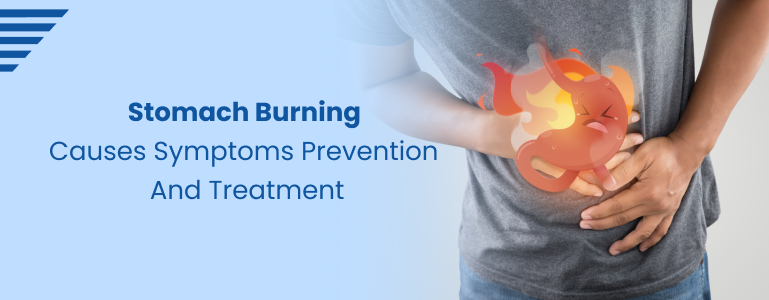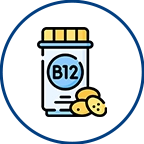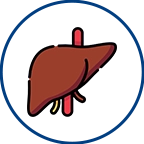Stomach Burning - Causes, Symptoms, Prevention & Treatment

Stomach burning, often characterized by a burning sensation in the upper abdomen, can be uncomfortable and problematic. Numerous factors, from small problems to more significant underlying illnesses, might cause it. In this blog, we will delve into the causes, symptoms, prevention, and treatment of stomach burning to help you better understand this condition and take steps to alleviate it.
Causes of Stomach Burning:
Acid Reflux (Heartburn): One of the most common causes of acid reflux occurs when stomach acid flows back into the oesophagus, leading to a burning sensation in the chest (heartburn).
Gastritis: Inflammation of the stomach lining can result in stomach burning, often accompanied by abdominal pain, nausea, or vomiting.
Peptic Ulcers: Ulcers in the stomach or duodenum can cause a burning sensation. These ulcers can be caused by infection with either chronic nonsteroidal anti-inflammatory medication (NSAID) usage or Helicobacter pylori.
Spicy or Irritating Foods: Consuming spicy foods, excessive caffeine, or alcohol can irritate the stomach lining and lead to a burning sensation.
Overeating: Eating large meals or consuming heavy, fatty foods can overwhelm the stomach and cause discomfort.
Home Sample Collection
Symptoms of Stomach Burning:
Common symptoms of stomach burning include:
Burning sensation in the upper abdomen
Heartburn or chest pain
Nausea or vomiting
Bloating and belching
Regurgitation of food or acid
Prevention of Stomach Burning:
Dietary Modifications: Avoid spicy, fatty, or irritating foods, especially if prone to acid reflux or gastritis. Opt for smaller, more frequent meals.
Limit Alcohol and Caffeine: Reduce alcohol and caffeine intake, as these substances can irritate the stomach lining.
Stress Management: High-stress levels can exacerbate stomach burning—practice relaxation techniques like meditation and deep breathing.
Maintain a Healthy Weight: Excess weight can increase pressure on the stomach, leading to acid reflux. Both exercise and a good diet are necessary to maintain a healthy weight.
Avoid Smoking: Smoking can contribute to acid reflux and gastritis, so quitting is beneficial.
Treatment of Stomach Burning:
Over-the-counter medications: Antacids, H2 blockers, and proton pump inhibitors (PPIs) can relieve heartburn and reduce stomach acid.
Prescription Medications: In more serious situations, your doctor can recommend stronger drugs to control acid production or treat underlying diseases like gastritis or ulcers.
Lifestyle Changes: Smaller meals, avoiding lying down right after eating, and elevating the head of your bed can all help reduce acid reflux.
Dietary Adjustments: Work with a healthcare provider or dietitian to create a diet plan that reduces stomach irritation.
Treatment of Underlying Conditions: If stomach burning is due to an underlying condition like gastritis or ulcers, treatment will address that condition.
Conclusion:
Stomach burning can range from a minor annoyance to a symptom of a more significant health issue. The first step in solving the issue is identifying the underlying causes and accompanying symptoms. By implementing preventive measures and seeking medical advice when needed, you can manage and alleviate stomach burning, improving your overall digestive health and quality of life. If you experience persistent or severe stomach burning,For a correct diagnosis and a treatment plan customized for your requirements, speak with a healthcare professional.
Frequently Asked Questions
1. What does stomach burning feel like?
Stomach burning is typically described as a burning or painful sensation in the upper abdomen. Other symptoms like heartburn, nausea, or regurgitation may accompany it.
2. Is stomach burning the same as heartburn?
Stomach burning and heartburn are closely related, However, stomach burning refers to discomfort or pain in the upper abdomen, whereas heartburn specifically refers to the burning feeling in the chest or neck brought on by acid reflux.
3. When should I seek medical attention for stomach burning?
You should consult a healthcare provider if you experience severe or persistent stomach burning, especially if it is associated with other symptoms such as vomiting blood, difficulty swallowing, unintended weight loss, or black, tarry stools.
4. Can stress cause stomach burning?
Yes, stress can contribute to stomach burning. High-stress levels may exacerbate acid reflux and other digestive issues. Managing stress through relaxation techniques can be beneficial.
5. Are there foods that can trigger or worsen stomach burning?
Yes, spicy foods, fatty foods, caffeine, alcohol, and citrus fruits are common triggers for stomach burning and acid reflux. Avoiding these foods may help alleviate symptoms.
6. Can stomach burning be a sign of a more serious medical condition?
Yes, stomach burning can be a symptom of more severe conditions like gastritis, peptic ulcers, or gastroesophageal reflux disease (GERD). If symptoms continue, seeing a medical professional for a precise diagnosis is critical.
7. Are over-the-counter antacids safe to use for stomach burning?
Over-the-counter antacids like Tums and Maalox can relieve occasional heartburn and mild stomach burning. However, if symptoms are frequent or severe, it's advisable to consult a healthcare provider for a more comprehensive treatment plan.
8. Can lifestyle changes alone help manage stomach burning?
Changes to one's way of life, such as dietary adjustments, stress reduction, and weight control, can effectively manage and prevent stomach burning, especially in cases of mild acid reflux. However, chronic or severe cases may require medication or other treatments.
9. Can smoking worsen stomach-burning symptoms?
Smoking can contribute to stomach burning by increasing stomach acid production and weakening the lower oesophagal sphincter, allowing acid to flow back into the oesophagus. Quitting smoking can be beneficial for digestive health.
10. Is it possible to prevent stomach burning altogether?
While it may not always be possible to prevent stomach burning entirely, adopting a healthy lifestyle, including dietary adjustments, stress management, and avoiding triggers, can significantly reduce the frequency and severity of symptoms.
Book Your Slot
Our Locations Near You in Hyderabad
3KM from Banjara Hills
1.9KM from Yusufguda
3KM from Madhura Nagar
5KM from Shaikpet
Profiles
- Cardiac Risk Profile
- Pituitary marker Profile
- Rheumatoid Arthritis Profile
- Dengue Fever Panel
- Lung Cancer Panel 1 Complete Molecular
- Gastroenteritis Screening Panel
- Thyroid Profile (T3,T4,TSH), Serum
- Pancreatic Marker Profile
- STD profile
- Androgen Profile
- Lipid Profile, Serum
- Pancreatic(acute)Profile
- PCOD Profile
Radiology
Pathology Tests
- Glucose Fasting (FBS),Sodium Fluoride Plasma
- Creatinine, Serum
- Glycosylated Hemoglobin (HbA1C)
- Vitamin B12 (Cyanocobalamin), Serum
- Thyroid Stimulating Hormone (TSH) Ultrasensitive, Serum
- Complete Urine Examination (CUE), Urine
- Liver Function Test (LFT),Serum
- Dengue (IgG & IgM), Serum
- Dengue Antigen (Ns1) Rapid, Serum
- C-Reactive Protein (CRP), Serum
- Widal (Slide Method), Serum
- Total IgE, Serum




